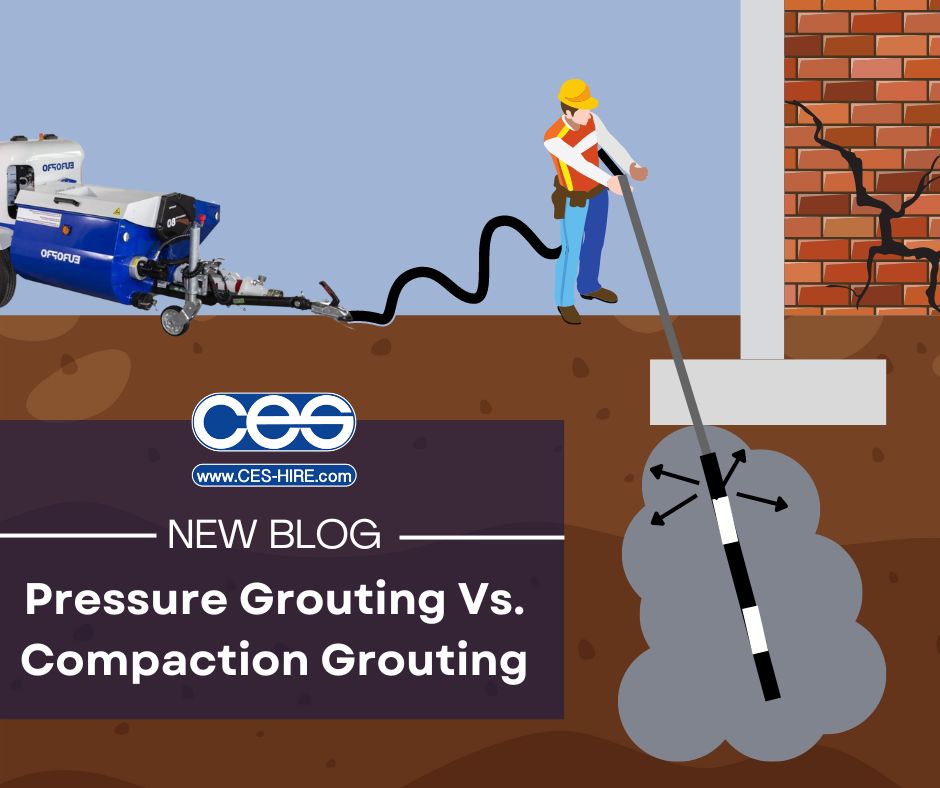“… And now it's solid. Solid as a rock”. Yes, putting this grouting blog together has got that 80’s tune on repeat in my head because essentially that’s what grouting is aiming for; achieving ground or an existing structure that is ‘solid as a rock’. In today’s blog we’ll explore the difference between pressure and compaction grouting.
Pressure Grouting
Pressure or permeation grouting is one of the most common types of grouting. The process is carried out to fill cracks, joints and voids in concrete, rock, soil and other porous material. Pressure grouting can be used in many applications including:
- As a barrier to groundwater flow
- To fill redundant drains, manholes and sewers
- To underpin and strengthen foundations
- To provide soil stabilisation
- To strengthen cavity or rubble walls
- Read more here>
One of the main differences with pressure grouting compared to other grouting methods is the material that is pumped. With permeation grouting a low-viscosity grout is injected which means it is more fluid-like and flows easily. This flowing grout is therefore able to permeate and seep through more absorbent materials such as granular soils or flow easily to fill cracks. The grout that is applied is dependent on the permeability of the area it is being pumped into. If the area is highly absorbent and allows fluid to easily flow through, a water-cement mix can be used. If the area is a lower permeability a more expensive resin-based grout will need to be used. With grainy substances such as soil, the grout will penetrate and mix with the soil, altering its properties to achieve a strengthened mass. For more information on the advantages and disadvantages of pressure grouting check out this blog >
Compaction Grouting
Compaction grouting is a grouting process in which ground improvement is achieved through pumping grout through 2-4 inch diameter injection pipes to pre-set depths. The big difference to note with compaction grouting is that a highly-viscous, stiff, mortar-like grout is applied. This type of grouting can also be known as low-mobility grouting since the grout does not flow from the injection zone or permeate through the surrounding soil. Instead, the low mobility cementitious grout is pumped with great control to form a solid spherical bulb. These bulbs remain as one mass and push the surrounding soil to the side to compact it and increase the density of the ground. Injection begins at the lowest depth first (injection can be from 2m down to tens of metres) and works upwards in steps of 1m at a time to create a column of overlapping grout spheres. Whilst pumping occurs at high pressure, this must also be controlled so as not to over-compact the ground and cause damage. Grout is pumped between 4-6㎥ per hour and even as controlled as 2㎥ per hour in more delicate substances. The main uses of compaction grouting include:
- rubble fills, poorly placed fills, loosened or collapsible soils, soluble rocks and liquefiable soils
- Improving ground-bearing capacity when additional load is added to the current structure.
- Decrease or correct settlement
- Densifying ground beneath an existing structure in preparation for lifting and re-leveling them
- Stabilise sinkholes
- Stabilising the ground where pipes will be installed
So which to choose?
Compaction and pressure grouting are very similar in that the process injects grout to improve ground stabilisation or to fill a void. Both methods are also able to be carried out in areas of restricted access and are a much quicker installation process that doesn’t disrupt the existing site. Alternatives to grouting include piling which would cause a great deal more interruption and disturbance to the ground. You should take into consideration the ground conditions that you are injecting into to make an informed decision as to whether compacting the ground or permeating the ground/soil is the right route. At CES we are here to help. Take a look at our blog to learn more about the grout pumps we offer. Alternatively, give us a call (01494 715472) to speak to one of our expert team who can advise you on the options available.

